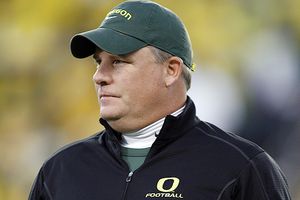In college football, you don’t want to get a bad rap.
It’ll start messing with players’ heads. It’ll be heard in recruits’ homes. It’ll infiltrate columnists’ laptops.
The Oregon Ducks went underground this past week, preparing in earnest for the huge LSU matchup on Saturday night in Arlington, Texas. No. 3 vs. No. 4 in the season opener. A national television audience ripe for some big-time football. The winner having an early inside track to the BCS title game.
But for Chip Kelly’s Oregon program, there’s another — perhaps more important — storyline at work: A chance to dispel the notion it can’t beat opponents who have weeks to prepare for the Ducks’ offensive wizardry.
You know the talk — and the evidence. There was that 19-8 loss to Boise State in the 2009 season opener in Kelly’s first game as head coach, followed by a 26-17 setback to Ohio State in the Rose Bowl later that same season. And then that 22-19 loss to Auburn in January’s national championship game, following a 12-0 perfect regular season mark.
In those three defeats, Oregon averaged just 14.7 points and 287 total yards a game — far below the 45.0 points and 495.4 yards a game the team produced in the 23 other games under Kelly.
“It seems like when good teams get extra time … they figure out a way to stop the high-powered Oregon offense,” ESPN.com’s Ted Miller wrote following the BCS title tilt against Auburn. “We don’t have an answer to that, but Oregon coach Chip Kelly needs to find one.”
And now comes LSU and another test — and chance — for Kelly and the Ducks.
Make no mistake about it. Just like Boise, Ohio State and Auburn, the Bengal Tigers have been readying for Oregon’s zone-read, spread-option offense for a long, long time.
“We started preparing in the spring,” said Tigers defensive coordinator John Chavis.
Some suspect it was likely before then — say Jan. 11, the day after the Glendale heartbreaker.
For Duck fans, seeing the fireworks disappear during showtime — in particular the two bowl games — has been bewildering.
Kelly is 5-0 out of conference otherwise, averaging 51.6 points in those contests. In league play, his teams have captured 17 of their past 18 games, averaging 43.2 points in the process.
Take your eyes off the Ducks at your own risk.
“I remember a few years ago watching Oregon and saying to my wife, ‘Who has the ball?” former Washington coach Don James said in a Seattle Times online chat earlier this week.
Until season openers or bowl games, that is.
Then things for some reason fall flat.
Theories abound. Overconfidence and a green offensive line in the setback against Boise State. An erratic Jeremiah Masoli in Pasadena. A really big guy named Nick Fairley (along with some other sure tacklers) last January. Not to mention a multitude of TV timeouts in the latter two showdowns that took away the effectiveness of the Ducks’ no-huddle attack.

Duck players, from left, LeGarrette Blount, Jeremiah Masoli, Darron Thomas and Tyrell Irvin stare at the scoreboard late in Oregon's game against Ohio State in the 2010 Rose Bowl. The Ducks fell 26-17 as the Buckeyes held Oregon's offense to just 260 total yards.
But others say the answer is simpler: Oregon’s offensive line got manhandled by a bigger, faster defensive line each time.
Even Kelly seemingly gave a nod to that line of thought during the annual East Coast media circuit in late July.
“What I did learn is that Auburn is really good on defense,” Kelly said when poked by ESPN’s Chris Fowler.
Not to call out Kelly here since he was only referring to one game, but didn’t Auburn come into “the Natty” with the nation’s 60th-best defense? And while we’re at, didn’t USC feature a fast big D-line the past two seasons and get flattened by the Ducks?
There are signs that Kelly is adapting and learning. In Oregon’s losses to Boise State and Ohio State, offensive production was abysmal, both rushing and passing. Against Auburn, Oregon’s running attack was ineffective again — just 75 total yards and a 2.3 yards per rush average — but Darron Thomas threw for 363 yards and two touchdowns and the Ducks had roughly the same total yardage as the Tigers prior to Auburn’s game-winning drive.
“We probably should have let Darron throw the ball a little more in the Auburn game,” Kelly told Fowler. “We relied on our running game, but Darron had a great game throwing the football after he got settled down a little bit. Maybe me not being so stubborn and throwing the ball a little bit.”
As Saturday’s game plays out, much of the attention will be on which team remains on track for a shot at the national title.
But win or lose, the doubters will be ready to pounce if Oregon’s high-octane attack sputters.
Players play the game. Coaches put players in position to succeed. But coaches also get paid the bucks to win games — particularly big games.
Kelly needs to find a way around his foe’s long-in-the-making adjustments.
He needs to rid the Oregon program of that rap.
Related Articles:
Chip Kelly Update: Everything's Good Again ...
Chip Kelly Update: Wailing and Gnashing of Teeth
Shock and Awe -- The Oregon Ducks' Football Hangover Effect
Despite Lopsided Score, Georgia State "Never Stopped Believing"
Hope Springs Eternal for Ducks
Incompetent Pac-12 Officials: How Do You Miss ALL of THIS?
These are articles where the writer left and for some reason did not want his/her name on it any longer or went sideways of our rules–so we assigned it to “staff.” We are grateful to all the writers who contributed to the site through these articles.

